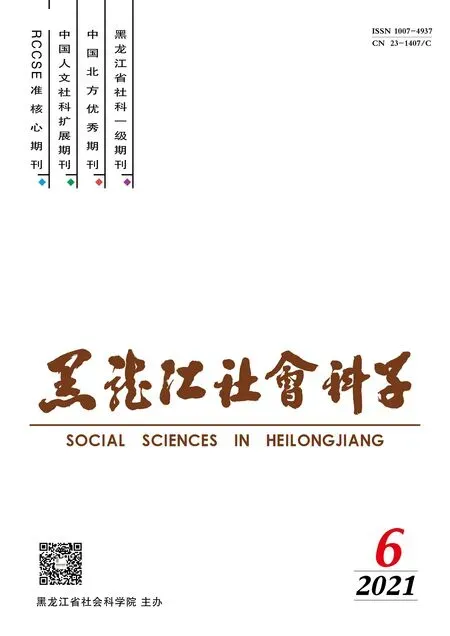ABSTRACTS
2021-01-12
TheCentennialCourseandExperienceoftheIdeologicalWorkoftheCommunistPartyofChina
GAO Hong-gui1, CUI Ming-zhu2
(1.SchoolofMarxism,ShandongTechnologyandBusinessUniversity,ShandongYantai, 264005,China; 2.HeilongjiangAcademyofSocialSciences,Harbin150028,China)
Abstract:Over the past century, the Communist Party of China has continuously strengthened the construction of mainstream ideology, always adhered to the party’s leadership, continuously promoted the innovation of Marxist theory, accurately grasped the historical direction and world pattern, and constantly innovated working methods and working mechanisms. In the new era, the Communist Party of China should further strengthen ideological work, firmly grasp the absolute leadership over ideological work, keep pace with the times in ideological education, pay attention to the continuous innovation of ideological work methods, and strengthen the cultivation of high-quality ideological work team.
Keywords:Communist Party of China; Ideological Leadership; Marxism; Social Ideological Trend
Hegel’sTheoryofCivilSocietyandItsDimensionofRuleofLaw
HUANG Qi-hong1, YU Yong-cheng2
(1.MarxistTheoryResearchCenterandInstituteofWesternMarxism,SouthwestUniversity,Chongqing400715,China; 2.InstituteofMarxistPhilosophy,ShanxiUniversity,Taiyuan030006,China)
Abstract: Hegel is not only a philosopher who systematically demonstrated civil society for the first time in the history of western thought, but also an important representative to explore the connotation and significance of the rule of law under the background of civil society. His thought is an important theoretical source of Marxist rule of law. Hegel not only distinguishes civil society and state from the perspective of objective ethical schizophrenia and development, but also implements the pursuit of values such as freedom, equality and contract spirit into the discussion of civil society, which constitutes an important basis for us to understand the legal direction of Hegel’s civil society theory. Hegel not only revealed the social premise of the rule of law, but also revealed the embodiment of the rule of law on the ethical essence of civil society, the maintenance of civil society freedom, and the guarantee of civil society equality and contract spirit.
Keywords:Hegel; Civil Society; Rule by Law; Country; Ethics; Contract Spirit
HowistheBasisofMoralityPossible——AlsoonMacIntyre’sMoralEthics
DU Yu-penga, LI Han-yangb
(a.CollegeofHumanitiesandSocialSciences;b.CollegeofMarxism,HarbinEngineeringUniversity,Harbin150001,China)
Abstract:In western philosophy in the late 20th century, moral issues have become the focus of debate among philosophers, which has something to do with MacIntyre’s attention to virtue ethics since Aristotle. While criticizing modern emotionalist ethics, MacIntyre re-examines the basis of morality and holds that the basis of morality can not be found from Hume, Kant and Kierkegaard, who represent modern moral discourse, nor from Nietzsche, who represents post-modern moral discourse, but can only return to pre-modern and Aristotle, re-establishing teleological virtue ethics from the perspective and method of historicism. In this way, the relationship between virtue and tradition, virtue and practice has been reintegrated into the research perspective of contemporary western ethics.MacIntyre’s virtue ethics regains people’s confidence in universal morality, and has important practical significance for the transformation of modern philosophy from theoretical philosophy to practical philosophy.
Keywords:MacIntyre; Virtue Ethics; Enlightenment; Moral; Good; Justice; Practice
OnJudicialCompulsionandPartyAutonomyinModernSocialGovernance——TakingtheConflictandSolutionoftheCourt’sDualRoleastheStartingPoint
SHEN Chen
(SchoolofLaw,UniversityofChineseAcademyofSocialSciences,Beijing102488)
Abstract: In modern social governance, the social needs of dispute resolution expect the court to be not only a judge, but also a provider of diversified dispute resolution services. However, in the process of dispute resolution, these two roles focus on judicial coercion and party autonomy respectively in value orientation, resulting in the conflict of dual roles. As a mixed product of ADR system and judicial system, judicial ADR system not only retains the flexibility and responsiveness of ADR procedure, but also has the institutionalized characteristics of judicial procedure. The analysis and study of judicial ADR procedure technology and the balance between judicial coercion and party autonomy can provide a more specific and operable path for the settlement of the conflict of court dual roles.
Keywords:Social Governance; Judicial Compulsion; Party Autonomy; Judicial;ADR System
